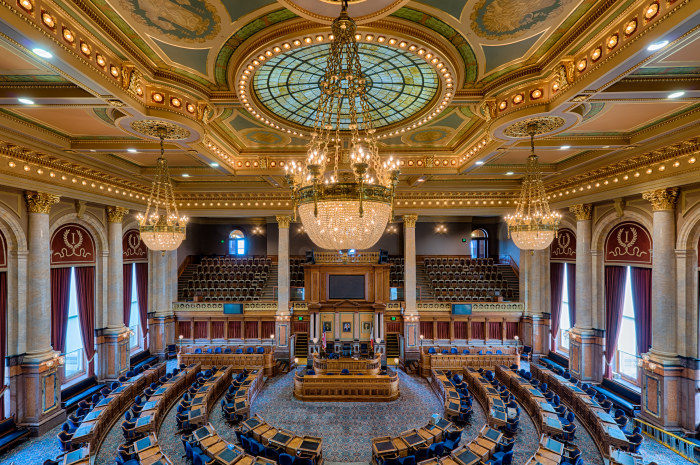Republicans have controlled the Iowa House since 2011 and will continue to set the agenda in the lower chamber for the next two years. However, the GOP majority will shrink from 59-41 to either 54-46 or 53-47, depending on whether one lawmaker’s eight-vote lead holds up.
REPUBLICANS LOSE SEVEN SEATS
Democrats were targeting a large number of GOP-held seats and picked up seven. Four Republican incumbents lost, according to unofficial results:
• Heather Matson defeated Representative Kevin Koester in House district 38 by 7,883 votes to 7,438 (51.5 percent to 48.5 percent).
• Karin Derry defeated Representative Jake Highfill in House district 39 by 9,318 votes to 9,113 (49.6 percent to 48.6 percent).
• Kristin Sunde defeated Representative Peter Cownie in House district 42 by 7,952 votes to 6,890 (53.6 percent to 46.4 percent). This was the most expensive state House race in Iowa history.
• Dave Williams defeated Representative Walt Rogers in House district 60 by 7,928 votes to 7,699 (50.7 percent to 49.3 percent).
Democrats also picked up three seats where GOP lawmakers did not seek re-election.
• Jennifer Konfrst defeated Michael Boal in House district 43 by 8,495 votes to 6,223 (56.6 percent to 41.4 percent). She lost a tough race to House Majority Leader Chris Hagenow in 2016. After Hagenow fled to safer territory in Dallas County rather than try his luck against Konfrst again, Republicans did not try to defend this seat.
• Kenan Judge defeated Anna Bergman in House district 44 by 11,136 votes to 9,937 (51.7 percent to 46.1 percent). Republicans spent heavily trying to hold this seat.
• Molly Donahue defeated Randy Ray in House district 68 by 8,530 votes to 6,947 (55.1 percent to 44.9 percent). Like Konfrst, she competed for this seat in 2016 but lost to GOP incumbent Ken Rizer. Following his retirement, Republicans gave up without a fight.
First-term Republican Michael Bergan leads Kayla Koether by eight votes (6,902 to 6,894) in House district 55. He may not maintain that lead, since late-arriving absentee ballots can be counted if the envelope was postmarked on November 5 or earlier. Either way, there will be a recount here.
DEMOCRATS LOSE TWO SEATS
Democrats lost two of the 41 House seats they controlled going into the election, according to unofficial results.
• Republican Ann Meyer defeated Megan Srinivas in House district 9 by 5,600 votes to 5,216 (51.8 percent to 48.3 percent). Both parties spent significant funds trying to win this seat, where Democrat Helen Miller retired after serving eight terms. UPDATE/CLARIFICATION: The Iowa GOP spent more than $280,000 supporting Meyer. Democrats spent less than half as much on tv ads for Srinivas and limited those in-kind expenditures to the amount Srinivas had transferred from her campaign to the House Truman Fund.
• Jeff Shipley leads Representative Phil Miller in House district 82 by 6,105 votes to 6,062 (50.2 percent to 49.8 percent).
This one hurts. Democrats invested huge resources to help Miller win an August 2017 special election following the death of Representative Curt Hanson. Republicans didn’t recruit a candidate here before the primary filing deadline. Shipley stepped up over the summer; he had unsuccessfully challenged Hanson in 2014.
Neither party appears to have grasped that this seat was in play. Campaign finance disclosures indicate Republican leaders spent nothing on behalf of Shipley, who raised and spent little over the past few months. The Iowa Democratic Party kicked in only about $11,000 for direct mail supporting Miller. He raised and spent little on his own campaign.
Forty-three votes sounds close enough for a recount, but over the past decade, recounts have not altered the outcome of several Iowa House or Senate races that were decided by even narrower margins.
MOST TARGETED INCUMBENTS WON RE-ELECTION
Republicans spent six figures trying to defeat Representative Timothy Kacena in House district 14, but he defeated Robert Henderson by a comfortable margin: 4,600 votes to 3,932 (53.9 percent to 46.1 percent).
Democrats were nervous enough about Representative Charlie McConkey to spend $128,000 on his behalf, but he defeated LeAnn Hughes by 4,620 votes to 3,584 (56.3 percent to 43.7 percent).
The following Republicans won another term in districts where one or both parties spent more than $100,000 (click here for details on that spending).
• Representative Shannon Lundgren defeated Nancy Fett in House district 57 by 8,646 votes to 6,615 (55.0 percent to 42.0 percent).
• Representative Ashley Hinson defeated Eric Gjerde in House district 67 by 8,551 votes to 7,854 (52.1 percent to 47.9 percent).
• Representative Gary Carlson defeated Laura Liegois in House district 91 by 5,655 votes to 4,844 (53.9 percent to 46.1 percent).
• Representative Ross Paustian defeated Jean Simpson in House district 92 by 6,544 votes to 5,908 (52.6 percent to 47.4 percent).
• Representative Gary Mohr defeated Joan Marttila in House district 94 by 9,224 votes to 7,562 (55.0 percent to 45.0 percent).
• Representative Louis Zumbach defeated Christian Andrews in House district 95 by 8,194 votes to 6,970 (54.0 percent to 46.0 percent).
Finally, Phil Thompson kept the open House district 47 in the Republican column, beating David Weaver by 6,851 votes to 5,961 (51.8 percent to 45.0 percent). The GOP spent about $187,000 supporting Thompson; Democrats did not make this district a priority.

